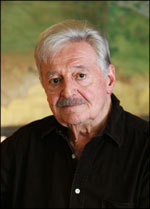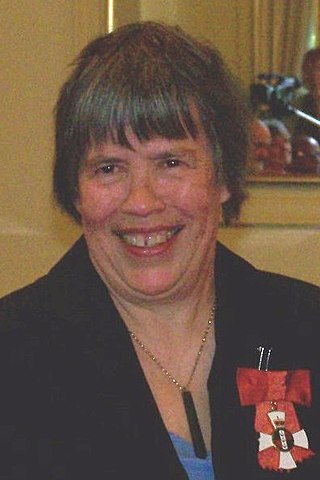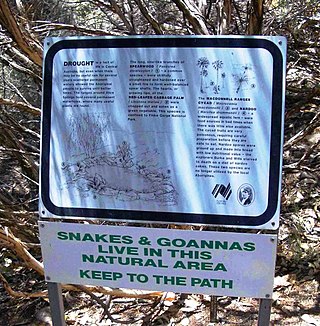Related Research Articles

Peter Joshua Sculthorpe was an Australian composer. Much of his music resulted from an interest in the music of countries neighbouring Australia as well as from the impulse to bring together aspects of Aboriginal Australian music with that of the heritage of the West. He was known primarily for his orchestral and chamber music, such as Kakadu (1988) and Earth Cry (1986), which evoke the sounds and feeling of the Australian bushland and outback. He also wrote 18 string quartets, using unusual timbral effects, works for piano, and two operas. He stated that he wanted his music to make people feel better and happier for having listened to it. He typically avoided the dense, atonal techniques of many of his contemporary composers. His work was often characterised by its distinctive use of percussion. As one of the compositional pioneers of a distinctively Australian sound, Sculthorpe and his music have been likened to the role played by Aaron Copland in America's musical coming of age.
Sir Bernard Thomas Heinze, AC, FRCM was an Australian conductor, academic, and Director of the New South Wales State Conservatorium of Music.

Dame Gillian Karawe Whitehead is a New Zealand composer. She is of Māori Ngāi Te Rangi descent. Her Māori heritage has been an important influence on her composing.
John Raymond Hopkins AM OBE was a British-born Australian conductor and administrator.
The Contemporary Singers of Australia were a chamber choir based in Sydney, New South Wales, dedicated to the choral music of the 20th century. The group was formed in late 1986 by visiting Canadian composer David Colwell with assistance from the University of Sydney and the NSW State Conservatorium of Music. Colwell directed the Singers for their first year, passing the leadership to Antony Walker and Elliott Gyger, who directed the Singers until 1999. Many of the original members were composition students of Peter Sculthorpe including Stephen Adams, Matthew Hindson, and Canadian composer Jana Skarecky.
Carl Edward Vine, is an Australian composer of contemporary classical music.

Olive Pink Botanic Garden is a 16-hectare (40-acre) botanic garden in Alice Springs in the Northern Territory of Australia, specialising in plants native to the arid central Australian region.

Piers Lane is an Australian classical pianist.

Olive Muriel Pink was an Australian botanical illustrator, anthropologist, gardener, and activist for Aboriginal rights who spent much of her life in Central Australia.
Graeme John Koehne, is an Australian composer and music educator. He is best known for his orchestral and ballet scores, which are characterised by direct communicative style and embrace of tertian harmony. His orchestral trilogy Unchained Melody, Powerhouse, and Elevator Music makes allusions to Hollywood film score traditions, cartoon music, popular Latin music and other dance forms.
Winsome Joan Evans OAM BEM, is one of Australia's premier early music specialists.
Nigel Henry Cockburn Butterley was an Australian composer and pianist.
Roger David Covell AM FAHA was an Australian musicologist, critic and author. He was Professor Emeritus in the School of the Arts and Media at the University of New South Wales, in Sydney, and continued until shortly before his death to contribute articles and reviews to The Sydney Morning Herald, where he served as principal music critic from 1960 until the late 1990s.
Deborah Joy Cheetham Fraillon is an Aboriginal Australian soprano, actor, composer, and playwright. She leads Short Black Opera, based in Melbourne, which provides training and opportunities for emerging Aboriginal and Torres Strait Islander musical artists.
The Sir Bernard Heinze Memorial Award is an Australian music award.
Rex Hobcroft AM was an Australian pianist, conductor, composer, teacher, competition juror and music administrator. He was the first Australian pianist to play the complete cycle of Beethoven's piano sonatas in public; he directed both the Tasmanian and New South Wales State Conservatoria of Music; and he co-founded the Sydney International Piano Competition.
Neta Anne Maughan is an Australian piano teacher. Her teaching career has spanned 63 years (2019) and in that time she has taught thousands of students in her main discipline of the piano, vocal, theory and accompaniment training.
The Melbourne Conservatorium of Music is the music school at the University of Melbourne and part of the Faculty of Fine Arts and Music. It is located near the Melbourne City Centre on the Southbank campus of the University of Melbourne.
Norma Phyllis Tyer was an Australian composer who wrote orchestral, choral, electronic and chamber music.
Gabriella Pusner is an Australian classical pianist and pedagogue.
References
- 1 2 3 4 5 Suzannah Pearce, ed. (17 November 2006). "BOYD Anne Elizabeth". Who's Who in Australia Live!. North Melbourne, Vic: Crown Content Pty Ltd.
- 1 2 "Emeritus Professor Anne Boyd". University of Sydney. Retrieved 4 October 2018.
- ↑ Hewitt, Donna G.; Hood, Anthony (2006). "Studio Report - Sydney Conservatorium of Music University of Sydney" (PDF). eprints.qut.edu.au.
- ↑ Mandy Campbell (21 March 2017). "Olive Pink inspires Anne Boyd's new orchestral work". University of Sydney. Retrieved 7 October 2022.
- ↑ Janelle White (19 September 2022). "Hot Pink: Anne Boyd's new opera about trailblazing Aboriginal activist Olive Pink" . Limelight . Retrieved 7 October 2022.
- ↑ "Anne Boyd: Imagination is our most precious resource : Feature Article : Australian Music Centre". australianmusiccentre.com.au. Retrieved 9 August 2019.
- ↑ "A lady of musical and running talents". Gold Coast Marathon. Retrieved 25 July 2019.
- 1 2 "An inspiring distance runner shares her story". ACRF. 8 July 2015. Retrieved 25 July 2019.
- ↑ "Boyd, Anne Elizabeth". Australian Honours Search Facility, Dept of Prime Minister & Cabinet. Retrieved 31 January 2018.
- ↑ "Anne Boyd receives Sir Bernard Heinze Memorial Award". University of York Music Press. 22 April 2015. Archived from the original on 9 November 2018. Retrieved 31 January 2018.
- ↑ "Sir Bernard Heinze Memorial Award". University of Melbourne. Retrieved 31 January 2018.